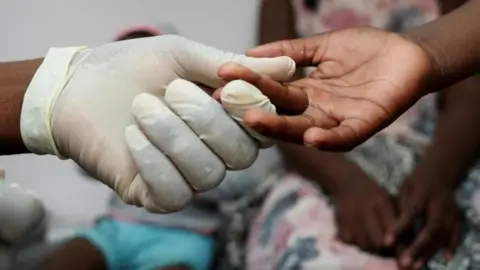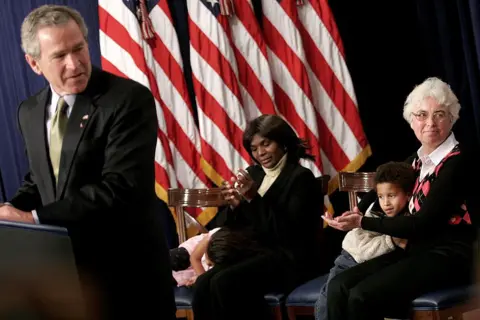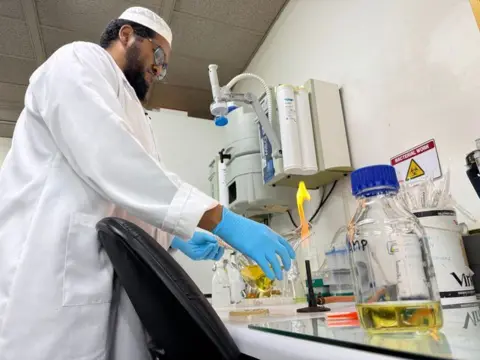
South African HIV/AIDS patients are concerned about treatment
BBC News, Johannesburg

 Rooters
RootersGoogu was collecting her anesthetiroverall from the USAID-unidentified clinic in the Central Johannesburg.
But when President Trump cut the funds at the beginning of this year, she and thousands of other HIV-positive patients in South Africa suddenly faced an indefinite future.
Googu was lucky, the clinic where she had a drug that helps to suppress her symptoms. She contacted her before closing.
“I was one of the people who could get a large amount of medicines. I usually collect three months of prescription. But before my clinic closes, they gave me nine -month drugs.”
She plans to go to the Antarotrovial (ARV) in September and then to go to her local public hospital.
A former sex worker, a 54-year-old boy found that she was HIV-positive after she left the industry.
Ten years ago, she had a chest cough and initially seemed to be tuberculosis. She went to a doctor who told her that she had a chest infection and treated her for her.
But when the treatment failed, she went to the clinic for HIV test.
“Until then I have already assumed that I am HIV-positive and I told the nurse.”
She was right, and since then she has been on ARVS. We do not use her true name at her request.
She currently serves as a project coordinator for the NGO.
“We help pregnant sex workers get their ARV, their children will be born HIV-negative. Mothers take timely medication and we visit home to make sure they care about their children when they go for monthly examination.”
Many HIV-positive sex workers in South Africa rely on a private clinic financed to get their rules and treatment by the US government, the USAID.
But after US President Donald Trump shortly after this year, most of the facilities were closed after most foreign aids were reduced.
Googu believes that many sex workers can be discouraged from going to a public hospital for their ARV if they could no longer get it from the clinic.
“The problem of going to a public hospital is a time factor. To serve these facilities, you have to reach 4 or 5 in the morning and they can wait for their medicine all day long. For sex workers, time is money,” says Gugu.
She further said that she recently went to his local hospital with some friends and to register her information and create a relationship with the employees.
“The nurses present with us were very strange. We told us that there was no special about sex workers.”
She thinks that many sexual workers can default to their drugs, “especially because their hospital files have a lot of personal information and anxiety is that sometimes the nurses in this local clinic are not always sensitive to this type of information.”

 Getty
GettyIn a report released on Thursday, the United Nations in charge of fighting HIV/AIDS did not take out the United States alone, but it is said that a hard cut from many donors has sent shocks worldwide. “Unprecedented progress” to deal with the risk of illness??
“New HIV transitions have been reduced by 1% from 1 and saved from 4 to 4.4 million children from getting HIV. More than 1 million million people have saved the lives of people,” says Ueds, saying that if the world does not work, there may be an additional six million new HIV infections and four million assistance.
UNADS said the annual number of new HIV transitions and AIDS -related deaths before the fund was deducted was submerged at the lowest level in more than 30 years.
All data published in the report is before the beginning of this year by the US and other donors before the funds are reduced. But the result of this deduction highlights how much progress can be lost.
The number of new transitions has decreased by 56% Africa Africa. The region is still the focus of the epidemic – half of all the new transitions in the last year were from the volume. But four African countries – Lestho, Malawi, Rwanda and Zimbabwe, compared to 1, were on the verge of getting a 5% reduction in new transit by 130.
Another success story for Africa is the performance of antterotrovial, which helps to suppress HIV symptoms. Along with other medical progress in this field, he helped to extend the life of Sub-Saharan Africa that the Years of 56 years to 26 years to 224 years.
When the then US President George W Bush launched an ambitious program to combat HIV/AIDS in 2003, he would give the United States to the “strategic and moral interests”.
Known as the Presidential Emergency Plan for AIDS Relief (PEPFAR), the world HIV/AIDS in response to $ 100 billion (£ 74 billion) has invested more than $ 100 billion (£ 74 billion) – the largest commitment made by any country to deal with the world’s same disease.
There are about 7.7 million people with HIV in South Africa, which is the highest in the world, According to the unaids??
About 9.9 million of them get antterotrovial treatment, resulting in a decrease in AIDS-related deaths by 66%, the UN agency has added.
The South African government has said that the PEPFAR fund contributed about 17% of its HIV/AIDS program. The money was used for various projects, including running a mobile clinic to facilitate the treatment of patients.
The deduction of the Trump administration has caused concern that the rate of infection can increase again.
“I think we think the number of HIV infections, the number of TB cases, the number of other infectious diseases,” Johannesburg’s deputy Vice -Chancellor of the University of Johannesburg. We will be seen by Lin Morris.
“And we will start to look at the opposite of what the story of the fundamental success is. We were getting up to some of these things.”
Googu said treatment is a matter of life and death, especially for unsafe people like sex workers.
“People do not want to default to their ARV. They fear that if they do not get access to them, they are going to die.
The deduction has also affected research for the purpose of detecting HIV vaccine and AIDS cure.
Professor Morris continued, “There is a long -term effect, which we will not get a new vaccine for HIV.”
“We will not be on top of the rotating virus. Can appear with a new virus, even you will not have the infrastructure of the surveillance once.”
South Africa is one of the world leaders in HIV research. Many drugs that help prevent the virus, which have benefited people around the world, have been tested in South Africa.
This includes a drug (pre-exposure prophylaxis), a drug that prevents HIV-negative people from catching viruses.
Another breakdown drug announced this year, Lenakapavari, injections taken twice a year and provide full protection from HIV, which was prosecuted in South Africa.


At a laboratory on Health Sciences Campus of Wits University, a small group of scientists is still working on HIV vaccine.
They are a part of the bright consortium, a group of labs working in eight African countries to develop a virus vaccine.
“We were developing a vaccine test to see how well it works and then we will test it on humans,” said Abdullah Eli, an associate professor at Wits University, tells the BBC in his lab.
“On the basis of Africa’s research, Africa had planned to conduct tests because we want our community as well as all mankind in that research.”
But the deduction of the US funding was suspicious of their work.
“When the stop order came, it means that we had to stop all of us. Some of us could get additional funds so we can continue our work. It has set us back months, may be a year too,” Prof. Called Eli.
The lab has a lack of funds to perform planned clinical tests by the end of this year.
“This is a great loss of South Africa and the continent. This means that any possible research that comes out of Africa will have to be tested in Europe or America,” says Professor Eli.
In June, universities asked the government to the Belout of 4.6 billion South African Rand ($ 260m; £ 190m) in the next three years.
“We are begging for support because South Africa is at the forefront of HIV research, but it is not leading to itself. It has an impact on the practice and policies of the whole world,” Dr. Fitthwe is called Matutu.
South African Health Minister Aaron Motosole announced on Wednesday that some alternative funds have been secured for research.
Bill and Melinda Gates Foundation and Welcome Trust have agreed to donate 100 meters each with immediate results, while the government will provide 400 meters of rand in the next three years, he said.
These researchers will bring a total of 600 meters of rand below the 6.6 billion rands requested by the researchers.
About Googu, she hoped that a treatment for HIV/AIDS would have been found until she was old, but now she was less optimistic.
“I am taking care of a nine -year -old boy. As long as I want to live to take care of him,” she tells the BBC.
“This is not a problem right now, we have to think about how it will affect the generation of women and young people.”
You may also be interested in:

 Getty Image/BBC
Getty Image/BBC












Post Comment